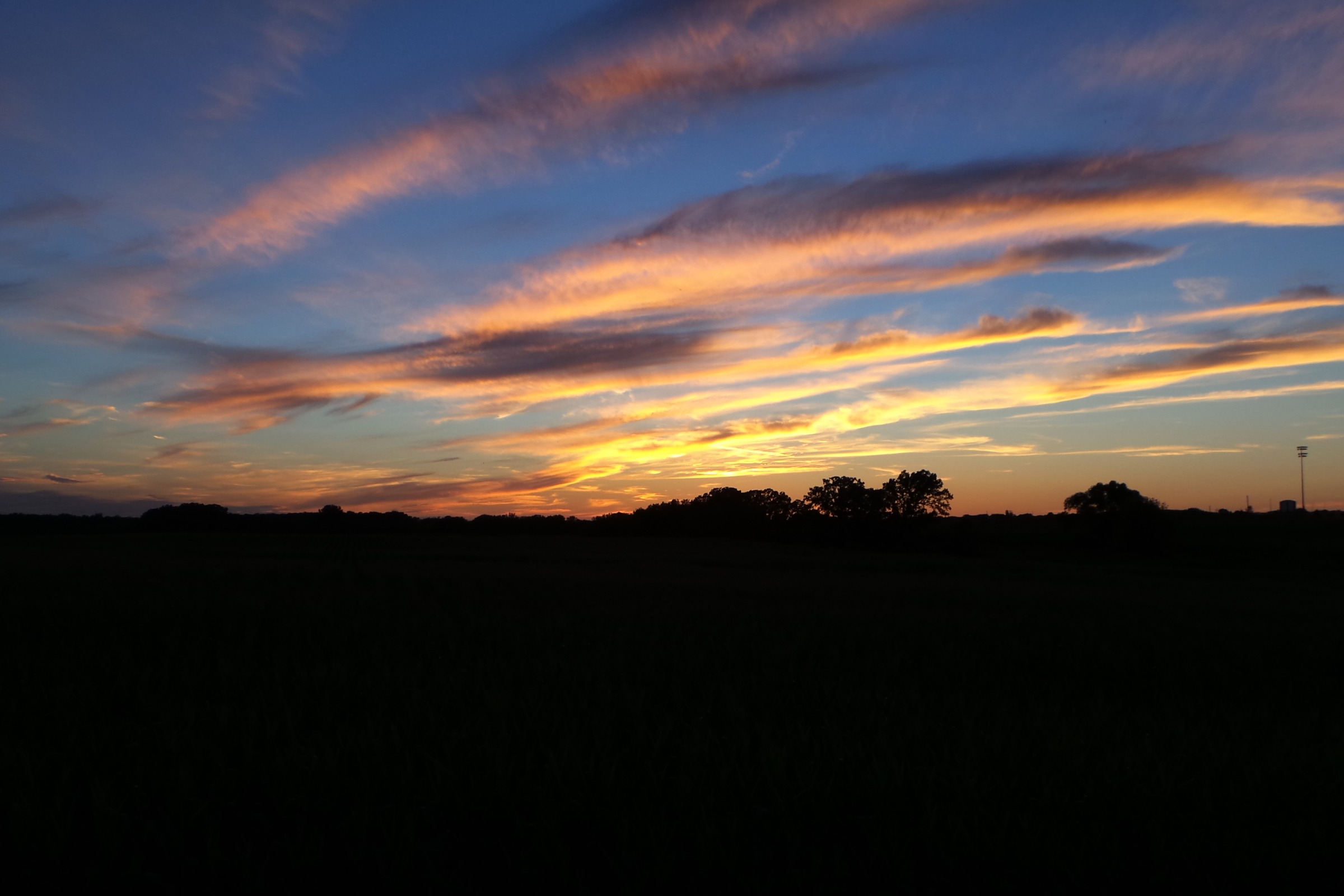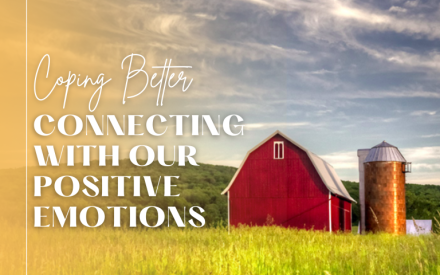🎧 Listen
Episode Summary:
Taking a moment to appreciate the simple things in life not only helps us stay safe, but keeps us rooted in the present and allows us to plan for a better, less stressful future. In this episode we speak with Dr. Larissa Duncan, State Specialist for Health & Well-Being at the Division of Extension and Faculty at University of Wisconsin – Madison and David Unbehaun, a Richland County farmer whose family has been on the land for four generations. They explain how a little bit of mindfulness can go a long way in helping to cope with daily life stressors and prevent us from not dwelling on things outside our control.
Transcript:
Ron Fruit: Welcome to the podcast, Coping Better, Connecting Our Positive Emotions where we talk about positive emotion skills in relation to farm stress. Today we’ll be discussing mindfulness in agriculture, one of the core skills of the WeCOPE series. I’m your host, Ron Fruit. Our guests today include Larissa Duncan, State Specialist for Health and Wellbeing at UW Extension, and a faculty member at UW Madison, and David Unbehaun, a Richland County farmer whose family has been on the land for four generations. Larissa says that mindfulness is really a fancy word for something pretty simple.
Larissa Duncan: Mindfulness is something that we all do to a greater or lesser degree in our daily life, which is what’s been defined as paying attention in a particular way on purpose in the present moment, and bringing some curiosity to what we’re experiencing. So not immediately judging what’s happening, but really being with what’s happening in this moment. We teach mindfulness now to help people be more present because a lot of research has shown that practicing mindfulness, being in the present moment in this way, can help us be happier and healthier.
Ron Fruit: David finds that mindfulness is an important part of life on the farm.
David Unbehaun: During the day, I try not to dwell on things that I have no control over. That’s when accidents happen. That’s when you’re now observing things that are happening around you. That’s pretty important when you work with other people and large equipment. You gotta be there, paying attention and not thinking about something that you can’t do anything about anyway.
Larissa Duncan: Dave, that is just an excellent example, and mindfulness has been used in a lot of different industries. It’s been used by emergency room physicians for just the kind of thing you’re talking about and for our agricultural colleagues, as you’re describing heavy equipment, a lot of things happening, maybe paying attention to where the cows feet are. My dad was a dairy farmer, making sure you don’t get kicked if you’re not paying attention, stuff can happen. Um, so there’s that aspect. There’s also the aspect of something you highlighted, which is not thinking about things you can’t do anything about. And as human beings, when we are meeting stressful situations in our life, when it’s something we feel like we can’t control or it’s something we feel a lot of uncertainty about in the future, we can tend to worry about that. We’re really good at planning, We’re really good at thinking through multiple avenues of what might happen so we can be prepared, so we can gather the resources we need to handle the challenges in our life. But when we get stuck on kind of a loop of worrying about the future, that can lead to a lot of stress, and that can cause physical health problems like high blood pressure, many different consequences of being too stressed about things we can’t control in the future.
David Unbehaun: When you’re skipping all the things that you have no control of over the day, at the end of the day or the start of the day, it probably would be nice to just assess the things that happen that day and then put ’em outta your mind for the rest of the day, which is hard to do for most people. And another thing that would help is limit our cell phone use as far as when we’re working. Don’t worry about getting to that text message right away or the newest YouTube video or something like that. Staying on task with what you’re doing, what you can control, and, uh, it would be wonderful.
Ron Fruit: The value of mindfulness goes beyond the borders of the farm. Extending mindfulness to hobbies and activities off the farm can have the same positive effect as it can during the workday. Dave enjoys golf and fishing.
David Unbehaun: My best fishing in story was when I took my dad fishing and, um, he caught a little fish and, um, I put it on, posted it on a website, and somebody said, ask, is that bait or is that a fish? And I gave him a picture of it showing Fishing license, $5. Fishing pole, $10. This picture, priceless. Kind of back to the old, uh, commercial. Those are kind of memories that, uh, I took the time. I was in the moment with him, and we enjoyed it.
Ron Fruit: During times of abundant stress, mindfulness can be challenging, which begs the question, should we force ourselves to be mindful all the time?
Larissa Duncan: Mindfulness is something we can practice, however, it’s not something that we should force; our minds do. What minds do they generate a lot of thoughts, and we have a lot of different feelings that come up as we encounter the things in our daily lives as we interact with those around us. Part of what mindfulness allows us to do is to bring it back to this moment. So to notice when our mind is wondering if we’re perhaps regretting something that we said to somebody when they upset us in a moment, and we can come back to this moment and remember our intention for how we wanna relate to others. We can find a lot of benefit from really simple practices to help us remember to come back to this moment. So paying attention to just breathing, taking a deep breath. If we’re finding ourselves worried or stressed about something or regretting something from the past, taking a breath, noticing some release of tension that we might be holding in our body and doing that on purpose throughout the day. It can happen, especially during key transitions. If you’re about to go through a doorway about to, you know, park your car, get out and go inside somewhere in that moment. Just take a couple slower, longer deep breaths and remember to be present.
David Unbehaun: Well, Larissa was talking, I, I thought of when I’m on one of the other farms, and to be mindful is to look out in the valley and just look at the crops and say, wow, it’s amazing to look out and see the, just the, the variation of color that, uh, nature gives us. And it can calm you. I mean, you just look out and you say, oh, and then your stress level should drop some. I like to say to people, I’ve got the best office in the world when I’m running a tractor somewhere and that helps with my stress level. Just look and see what’s around you and, and say, like I said, wow.
Larissa Duncan: Dave, you’re right about that. There’s so much research showing the benefit of being in nature and really it’s that wow moment you described of being mindful, taking a moment to pause and really appreciate the beauty that’s around us. It can be really useful too, as you mentioned in terms of farm safety. But I’m a beekeeper is the hive about to swarm. You can notice subtle cues that you might have missed otherwise if you have your phone out, if you’re not really appreciating and being in nature and being really present to the beauty. As you said, the crops can be stress relieving, and we see that even with physical health and wellbeing.
Ron Fruit: Larissa Duncan believes that understanding the application of mindfulness is important.
Larissa Duncan: Mindfulness is a way of training our brains. So the same way some people might do exercise to train your body to be healthier, um, to be more fit, to be stronger or more efficient with physical movement, mindfulness is a way to train the brain to be in the present moment instead of always rehearsing for the future or rehashing the past, which can cause anxiety. And depression really makes stress worse. Mindfulness is practicing being here, being now noticing the good around us that can help us really cope with stress. It’s something we can do in the moments in our daily life, and it’s also something we can do more formally. We can really practice for longer stretches of time. And that kind of practice we’ve seen from neuroscience studies changes the structure and the function of our brain in ways that are associated with more positive emotion, with being happier, being better adapted to coping with stress in our life. And so it’s always a challenge for me to find those times in my life where I can really practice mindfulness for longer stretches. And it’s something I keep coming back to, not trying to force it, but trying to find could there be five or 10 or even 15 minutes, um, where I could sit and practice the way I’ve been taught to really train my brain to be in this present moment so I can have the benefit in my daily life. More.
Ron Fruit: And a final suggestion. Remember the acronym, S.T.O.P.
Larissa Duncan: When something stressful happens in your day, practice stopping. And the stop acronym stands for Stop, take a breath, Observe, and then Proceed. So just give yourself a little space between whatever it is that’s happened and how you’re gonna choose to respond or react to that. And it can, it can take a moment, but it can really help.
Ron Fruit: I want to thank our guests, Larissa Duncan and David Unbeheven for sharing their knowledge and experiences with us. If you are interested in more information on positive emotional skills, please check out all the episodes in Coping Better, Connecting Our Positive Emotions.
Credits: Coping Better; Connecting with Our Positive Emotions is a product of a generous grant from the U.S. Department of Agriculture’s (USDA) National Institute for Food and Agriculture (NIFA) through a partnership with the Wisconsin Department of Agriculture, Trade and Consumer Protection (DATCP) and is adapted from the original WeCOPE curriculum, a ROTA grant funded program through the U.S. Substance Abuse and Mental Health Services Administration (SAMHSA).


 Coping Better Episode 7 | F.A.R.M.(ing) a Healthy Future
Coping Better Episode 7 | F.A.R.M.(ing) a Healthy Future


